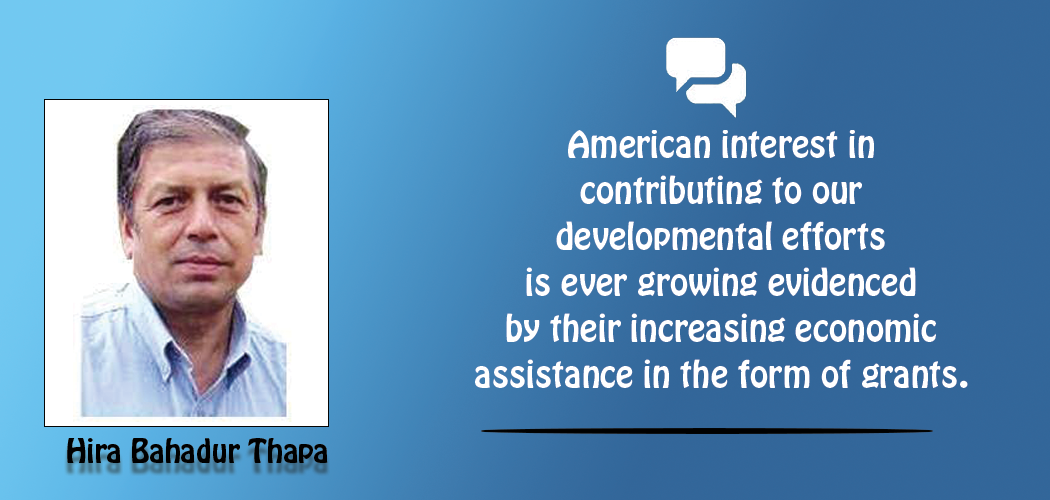- Thursday, 19 February 2026
Deepening Nepal-US Relations
Hira Bahadur Thapa
Nepal and the US are happily celebrating the 75th anniversary of the establishment of their diplomatic ties this year, with a flurry of visits from Washington in the last few months. This signals that both countries attach higher significance to their bilateral relationship. As Nepal and the US decided to set up diplomatic relations in April 1947, the former had such ties only with the United Kingdom (UK).
Great feat
Relations between these two nations have always remained cordial characterised by deepening cooperation in economic, political, cultural fields, among others. America has been the most noted permanent member of the UN Security Council, which played a crucial role in helping Nepal obtaining her membership of the high profile international organisation in 1955. This is a great diplomatic feat for a country like Nepal sandwiched between two Asian giants -- India and China -- at the time of increasing strategic geopolitical competition among powerful nations.
The era of US economic cooperation started in the 1950s, which covered education and agriculture, among others. The services provided by the members of US Peace Corps serving in schools as teachers of English and others in agriculture extension programmes can hardly be forgotten because the members of such group have left a deep impression of genuine friendship displayed by a developed country. The US was keen to see Nepal succeed in her struggle against underdevelopment and poverty.
Since then, the successive American administrations have been generous to Nepal’s need for economic development providing assistance as and when needed and asked for. No less is their commitment to ensure that democracy gets strengthened in Nepal demonstrated so evidently in the restoration of multiparty democracy in the 1990s. Being cognizant of Nepali people’s aspirations and respecting their choice of the system of government, the US also supported the 2006 popular uprising for a republican state.
Democratic principles have been the bedrock of our constitution. Nepal’s deeper commitment to strengthen such norms has convinced the US government that Nepal intends to pursue economic advancement firmly maintaining its democratic credentials.
This is the leverage that Nepal has in mobilising international support and goodwill not only from friends like the US but also from the wider global community. Various financial support packages from the International Monetary Fund being extended to Nepal in the current situation when the country’s foreign currency reserve has depleted fueled by pandemic and worsened by Ukraine crisis are examples of our international credibility.
At a time of growing anxiety due to ballooning imports and widening trade deficits with our imports making 90 per cent of international trade, Nepal feels the pinch of economic pain though the recent parliamentary ratification of $500 million grant under the US Millennium Challenge Corporation has been a great reprieve. Until the approval of above grant assistance in the last week of February, the issue invited controversies in the minds of the Nepali people for which the geopolitical concerns of great powers played no less important role.
It may be in the order of things to clarify why the US grant became so contestable which indeed delayed the operationalisation of the projects to be financed by the American assistance. Nepal’s geography is both a challenge and an opportunity. There is also a growing geostrategic competition between the US as an established superpower and China, which is an emerging rising power.
According to Harvard political scientist Graham Allison, the ongoing rivalry between the US and China is an illustration of Thucydides trap, which refers to conflict between two states in Greece in the long past when one of them apprehended that the other one was slowly rising in power and is likely to threaten its established power. Professor Allison coined this term for the first time in April 2009 when then Chinese Vice President Xi Jinping met with the US president Barack Obama in California.
This competitive relationship between two big powers of the world has cast a shadow on Nepal’s relations with them. Hence, Nepal is constrained to navigate her relations with them in a very prudent manner. Nepal cannot afford to cultivate her external relations that can be termed as being unfriendly to any one of our friends. The cultivation of Nepal’s relationship with one country can never be at the expense of another.
With reference to our relations with China and the US, this reality is much more pronounced and recent events in the country prior to the ratification of MCC compact grant substantiate this.
Genuine concerns
The visit of the Chinese Foreign Minister Wang Yi in the wake of ratification of MCC was also an opportunity for us to explain that Nepal views her relations with China with great significance and her acceptance of grant from the US, our old development partner, should not be regarded as an affront to our historical friendship with China. As a developing country, Nepal is willing to maintain cordial and cooperative relationship with all countries. Nepal is fully aware of our friends’ genuine concerns and is committed to fulfill her obligations to take care of them.
US-Nepal relations have completed more than seven decades and such ties have grown to be more deepened and extensive over the years. American interest in contributing to our developmental efforts is ever growing evidenced by their increasing economic assistance in the form of grants and we look forward to enriching our friendly bilateral relations, expecting high level visits from them highlighting the 75th anniversary of our diplomatic relations.
(Thapa was Foreign Relations Advisor to the Prime Minister from 2008-09.)
















-original-thumb.jpg)